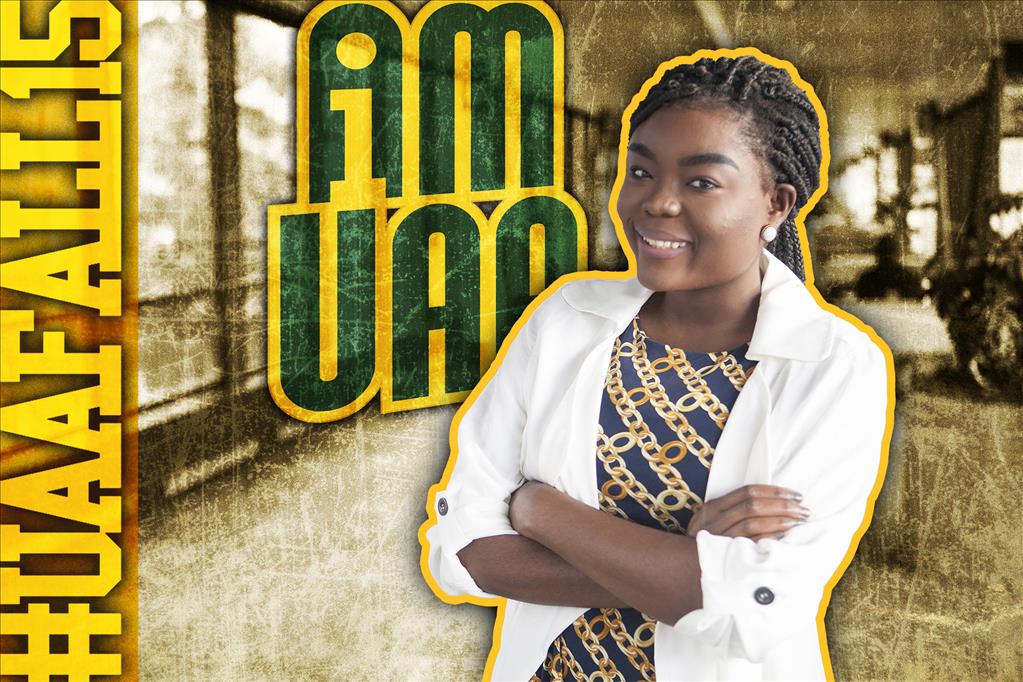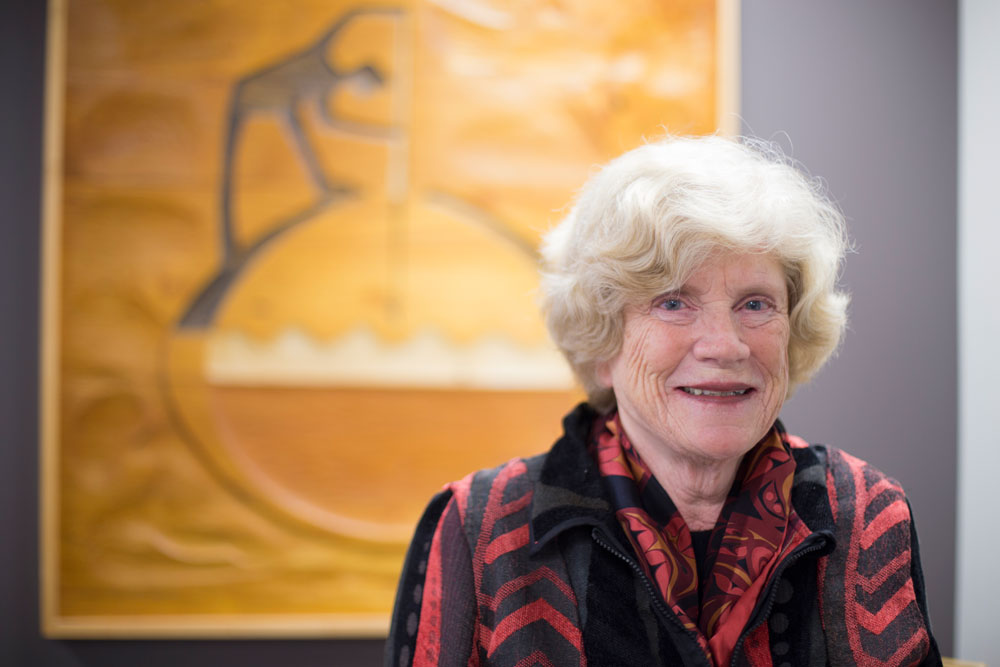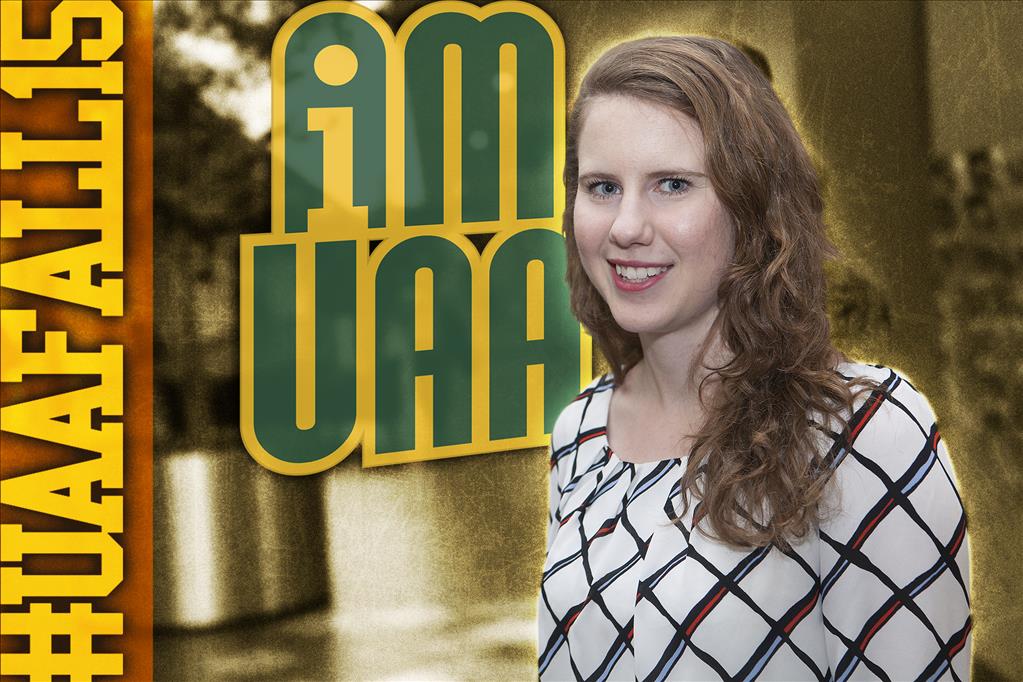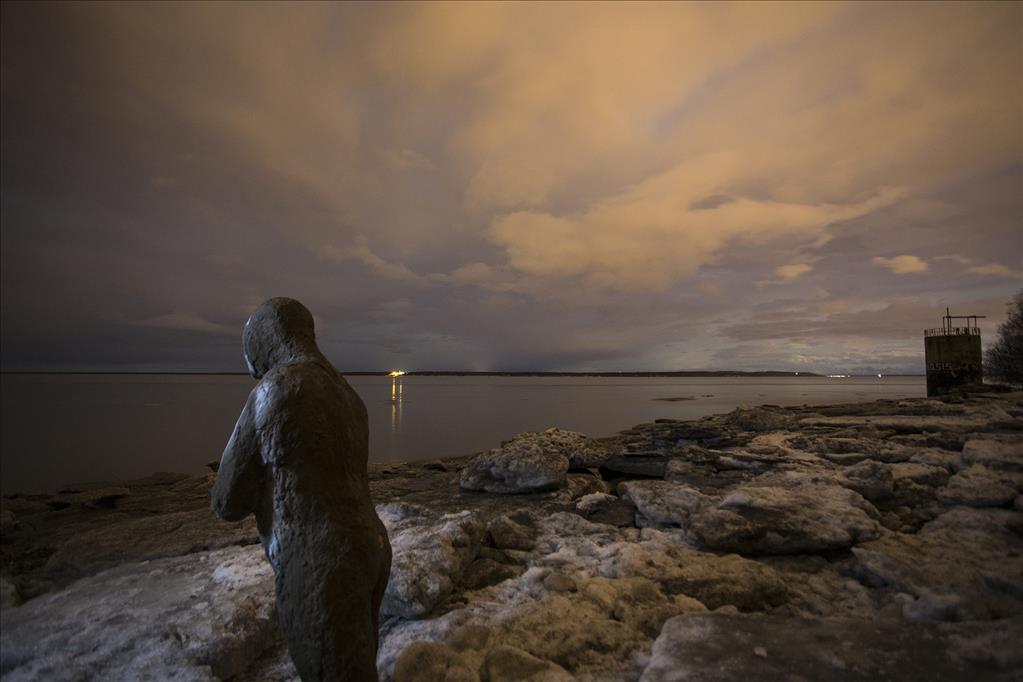Q and A with UA Student Regent Stacey Lucason
by Tracy Kalytiak |

UAA's Stacey Lucason is now serving as the University of Alaska Board of Regents' student regent. (Photo by Philip Hall/UAA)
Ten years ago, Stacey Lucason was working at Sears, stocking shelves and ringing out customers in the shoe, baby and jewelry departments. Now, Lucason is a former USUAA president and soon-to-be UAA Master of Public Administration student, and, since last month, she's been representing the interests of students in a two-year term as the student regent on the University of Alaska Board of Regents, governing body for all of the UA campuses statewide: UAA, UA Fairbanks and UA Southeast. We spoke with her recently about her new position on the Board.
What are the most pressing issues you hope to bring to the attention of your fellow Regents, and why?
First, I want to make sure students at all campuses have the opportunity for representation, that there are fair elections held across the state. Without real representation it is difficult to anticipate the impacts of policy on students, and all too easy to forget about different perspectives that may be far away and significantly different from those at the table.
In addition to just having elections, I think student governments need institutional support to ensure they are functional. This is a major priority for me because I want to be able to bring these views to the Regents from all across Alaska.
Second, as recent policy shifts have encouraged more cross-campus and cross-system course enrollment, there needs to be clarity on two things: whether the leadership is moving toward one university again or maintaining three separate institutions, and how responsibilities for students are split between their home institution and the secondary school where they may take a class or more.
For the former, the lack of clear direction from the top has caused a variety of negative reactions amongst the student base, including failing confidence in the ability of the system to offer full degree programs where students are able to attend. The push for more and more online education has some students questioning the quality of courses, with the perception that online classes are often less serious than learning in person. This is especially true when those courses come from outside the school a student attends because the faculty is not related to others in the department, so there is a perceived (and maybe real) lack of accountability.
The second half is related to fees and obligations on behalf of the campuses-should a student pay for access to a second student government, perhaps some thousand miles away, when taking a course from another school? Should students have access to the institutional supports, like two deans of students, when taking classes at more than one university? This is a situation that exists to a small extent already, but is growing as more and more students are encouraged to take classes from beyond the campus where they are working toward a degree.
What are some difficulties nontraditional students have with education the way it is presented now? What ideas do you have that might solve or lessen the severity of those difficulties?
There are distinct student populations at the University of Alaska and I'm not talking about Dillingham vs. Mat-Su, but different because of the reason they are students. Students tend to be lumped into one group. Yes, some students are 18 to 22 years old with a degree planned out, a career in mind, and all the extracurriculars lined up to match; but they are also people attending part time while working to advance or shift careers, and they are people who are taking a few classes or earning a certificate or degree just for personal growth.
All of these types of students have different needs beyond classes being available, which everyone shares, and it's worth discussing impacts to each group and weighing how important each policy is under those lenses.
Nontraditional students may have a specific plan for a career, know what degree they need and be academically capable walking in the door, but are much more likely to have to work full time, and are more likely to have family obligations. These students need to be considered in the way classes are scheduled, so it's doable to work and go to school. They also need recognition in support services offered on each campus, and even in advertisements promoting the universities, to avoid discouraging people when they only see 18- to 22-year-olds in promo materials.
What ideas do you have for better connecting scholarships with the people who most need them?
The first perception I would work to change is many students' feelings that they shouldn't bother to apply for scholarships. This was one of the top reasons cited in a survey USUAA undertook last year, and has popped up in advice columns and articles I've read since then. It may be as simple as adding a line or two to advertisements about the scholarship about making their experiences fit the criteria when telling their stories-like, leadership doesn't just mean being elected to something, but could be helping a classmate through a project or serving as a volunteer somewhere they care about.
You'd mentioned that "online everything" is not necessarily going to be the silver bullet for universities or for people seeking relevant, affordable education. What did you learn that led you to that opinion? How could online resources be better used and integrated into offerings at UAA?
I've heard repeatedly from administration and BOR that while the budget gets reduced from the state and costs go up, that students can just take classes online, like that is a perfect replacement for an in-person class that's no longer being offered.
It also assumes the same professors and students will do just as well online, which isn't necessarily true. My undergrad major in philosophy offered a stark contrast in the depth of discussion one can have when in a classroom versus when in an online chat room with people trying to get a GER out of the way in the easiest way possible.
There is an implicit pressure to participate in discussion when the teacher looks to you, which is only possible in a real classroom, and conversation flows so much more naturally when you're all in the same room. The difference in quality is not always online-equals-bad, in-person-equals-good, but there are fewer standards for online courses, fewer experienced professors, and a lot of ways to poorly do an online class with little feedback from peers or students.
One way that may help integrate online resources at UAA is a sharing of fees across students that take an in-person class, instead of just online students, to encourage faculty teaching in a classroom and supplementing with Blackboard to use it well.
I've heard the resources to help teachers integrate online components into their courses have gone underused in the past. I would also like to see un-embarrassing support options for students who need help using the online components-like tutoring in a dedicated lab that has sufficient staffing and hours to be worthwhile.
What is one way UAA could improve its "campus experience"?
Since coming to UAA, I've seen an evolution of campus life and have myself changed from a student that only attended part time in the evening to a full-time, working-on-campus, student. I think UAA does a good job of reaching niche groups with campus events-like students know about a panel discussion happening with faculty members from their own department, or rural Native Alaska students are invited to participate in cultural events-but there is still room for growth in extending those invitations beyond the small group and connecting with people from across campus.
What, for you, constitutes a productive and fulfilling educational experience and how did you learn along the way how to put together that kind of educational experience?
The most valuable experiences for me have been in learning what I don't want to do. Like as much as I admire Doctors Without Borders (aka MSF) or other individuals that are able to serve overseas, talking with several of them about missing family and being away for important events has shown me I probably won't pursue anything like that while I still have family alive in the area.
I've also learned experiences that encourage you to look back and see not only how far you've come, but ask where you're headed can be very productive. It can be easy to get bogged down in the frustrations of the day, but pausing to look at the bigger picture can be very helpful to put things in perspective. This is something that seems to work best in smaller groups, or even by oneself with some facilitation, like as an exercise we used in the Pre-Med Club getting ready for the annual Pre-Med Summit where we pose those questions to help students prepare for mock interviews.
I think anytime students tell their own stories, it becomes more clear, and can be used to shape the direction they're taking themselves, plus it is a useful practice for whenever one has to fill out a scholarship form.
What specific things can students do to engage themselves at UAA and create the best possible educational experience for themselves - especially if they are juggling jobs, trying to earn money for tuition, and/or taking care of a family.
I think students do benefit from finding a niche. Even with juggling many things, there is something each person is passionate about. This can be something related to their courses of study or totally separate, but carving out a little time every week for that thing that holds their interest through all the other ups and downs is really rewarding.
UAA has a huge opportunity for students to be involved, through clubs, by working with a department to do research or by being part of student government. Once students have tried out a couple of areas to develop their own area of interest, I think they find a comfortable place, their niche, and can really thrive there-it is just going for it in the first place that needs encouragement.
 "Q and A with UA Student Regent Stacey Lucason" is licensed under a Creative Commons Attribution-NonCommercial 4.0 International License.
"Q and A with UA Student Regent Stacey Lucason" is licensed under a Creative Commons Attribution-NonCommercial 4.0 International License.














